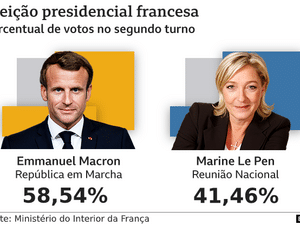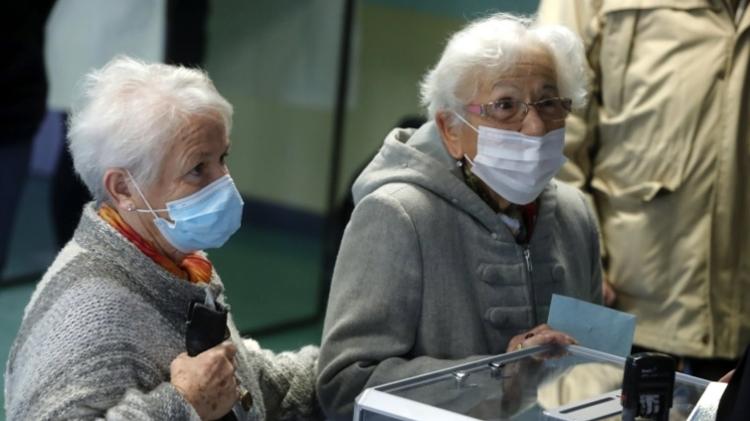French President Emmanuel Macron, who was re-elected on Sunday 24/4, will face various challenges in his second term. One of the most important will be to unite France after these elections and gain support from the most popular classes, which mostly prefer to vote or avoid voting for radical candidates of the right and left (in this case in the first round). . The strength of opposition Macron may face after the June legislation and the progress of unpopular measures such as pension reform depend on it.
According to the final results of the Ministry of Interior, Macron was re-elected with 58.54% of the votes. His second-round rival, Marine Le Pen, from the radical right, took 41.46% in a poll, the best result ever achieved by the National Assembly (Portuguese Reagrupamento Nacional, formerly known as the National Front).
Abstention was 28%, one of the highest rates in recent years.
Despite winning by a significant advantage, even more so for an incumbent president, it was a significant advance from the radical right Le Pen, who won 33.9% of the vote in the second round of the 2017 presidential election.
Macron’s victory by a good margin over Le Pen was made possible mainly by votes from voters from the radical left, Jean-Luc Mélenchon, who finished third with 22% in the first round. Like Le Pen, Mélenchon attracts mostly low-income French.
The purpose of these radical left voters to vote for Macron in the runoff was only to stop Le Pen’s rise to power. But a minority of Mélenchon’s voters decided to choose Le Pen at the other end of the political spectrum as a form of protest against Macron. The president has faced a lot of criticism for not caring about the low-income population.
In his speech on Sunday night, following the release of projections showing his victory in the gardens of the Champs de Mars with the Eiffel Tower in the background (in 2017, Macron had chosen the Louvre pyramid as the backdrop), the re-elected president acknowledged the division of France and voted for Le Pen. He promised to find “answers” to the French who expressed “anger and disagreement” or abstained from the election.
He acknowledged that a number of voters voted for him “not to support his ideas, but to stop the far-right”, and said he wanted his project to “take it strong in the years to come, while also being a custodian of the divisions and differences expressed.”
In his speech, Macron also said that “he is not the candidate of one camp, but the head of all”, vowing to overhaul the way France is governed, and said that the coming years will not be a “continuation” of the current era. He also declared that “no one will be left on the road”.
To reconcile the France of the upper middle class and major urban centers, in addition to the high-income retirees who make up Macron’s constituency, with the more popular France, the regions with higher unemployment, or the rural areas and small towns that favor Le Pen (and Mélenchon’s good poor circles in which he performs) is important for another challenge for Macron: securing a parliamentary majority in June’s legislative elections.
parliamentary majority
Traditionally, in legislative elections held shortly after the presidential election, the French vote for the party of the newly elected president, facilitating the start of his government to guarantee him a majority in parliament. Macron, who did not participate in any elections in 2017 and founded a new party, succeeded in winning the parliamentary majority from scratch.
This time, however, with the realignment of the French political scenario in this presidential election, in which Macron has consolidated two radical forces – Le Pen and Mélenchon – with his centrist party, the Republic, the task may be much more complex. The president is facing strong rejection from this part of the electorate.
On Sunday night, shortly after the unveiling of projections showing Macron’s victory, Mélenchou urged voters to take mass action in what he called a “third round” in the legislature as a way to guarantee a defeat. For the president in parliament and that way “change the way” of France.
He calls on the French to “elect himself prime minister”. In reality, it is the president who elects the prime minister after the legislature, not the direct voters. But if the head of state does not win a parliamentary majority, he must appoint a prime minister from the party that won the most seats in the vote. This is called “coexistence”. This is what Mélenchon has been waiting for.
Marine Le Pen also took advantage of Macron’s announcement of his victory in Sunday night’s speech to start the “legislative war” after his party had crossed the 40% threshold for the first time. referred to as the “great victory”.
pension reform
Another key challenge for Macron will be to implement pension reform, which envisages raising the minimum age gradually from the current 62 to 64 or 65 (initially its program was estimated at 65 years, but in the face of disagreements during the election campaign, he discussed with union leaders the possibility of limiting the increase to 64 years old). He said he was willing).
After the yellow vests crisis in 2018 and 2019, which began due to the fuel tax hike and turned into massive protests, often violent, to improve the purchasing power of the population, among other demands, the government has launched a new social mobilization in the streets against the pension reform project.
The measure will be discussed in the second semester after the legislative elections. To ensure the possibility of greater acceptance of this reform, Macron says some of the savings from the increase in the minimum age will be used to finance the adjustment of pensions for inflation (which is not in France), and this is possible, Macron says. It will be implemented from July.
Public debt
President Macron will face the challenge of tackling a high public debt, which represents around 113% of GDP and has increased by 600 billion euros during his tenure. About a third of this additional spending is due to the government’s “whatever it takes” policy during the pandemic, where it pays salaries during lockdown periods, in addition to a range of business aid and tax breaks. In addition, with the decrease in economic activity, government revenues also decreased.
This high public debt may reduce the government’s room for maneuver to implement measures to increase the purchasing power of low-income people in the context of rising inflation.
Also, the international scenario in which the war in Ukraine escalates is an additional concern for Macron. “We are going through tragic times,” Macron said in a speech on Sunday night, referring to the conflict.
As the newspaper Le Monde says, the so-called “state of grace” that a French president experienced when he was elected, and which usually lasted for several months at the start of his term, should not have happened in this re-election. Macron’s.
source: Noticias

